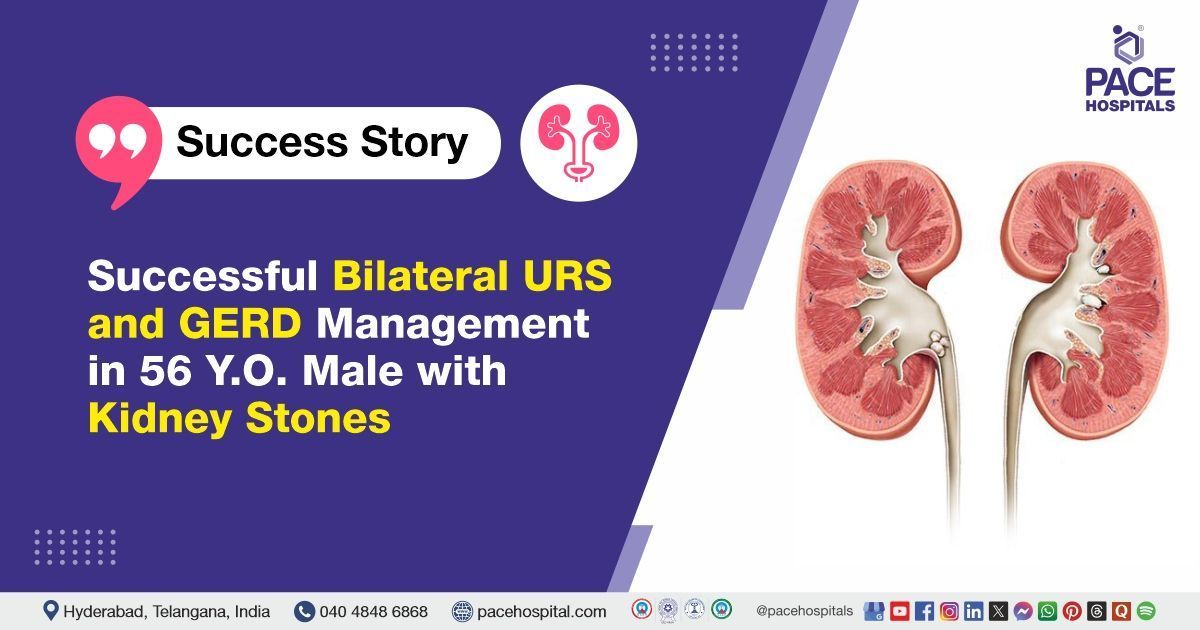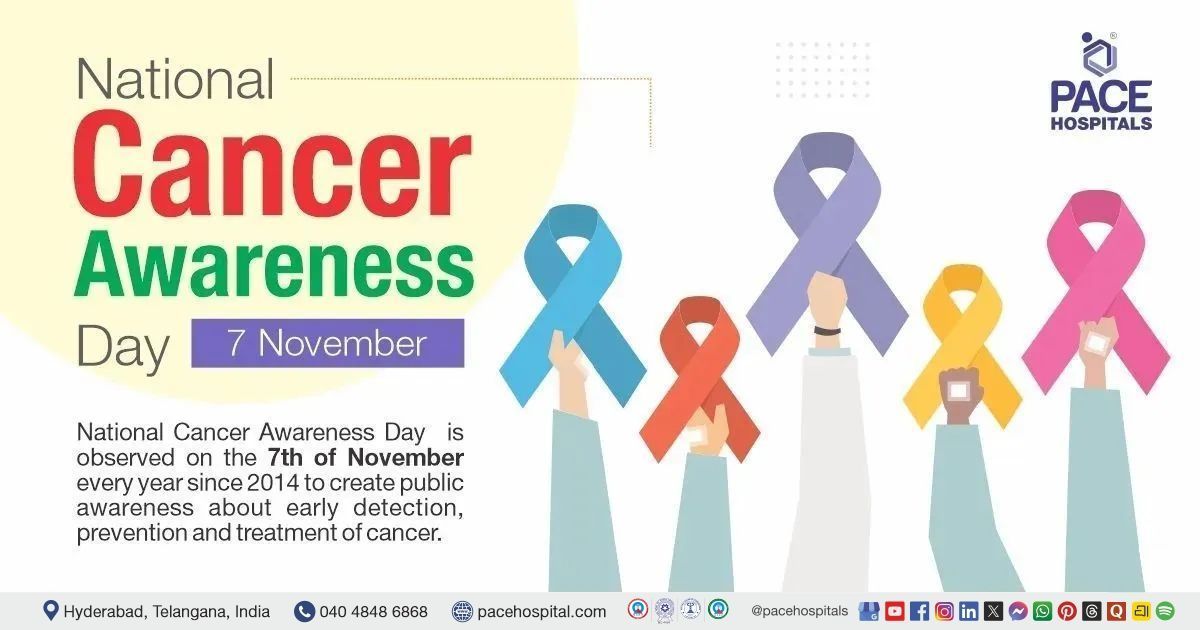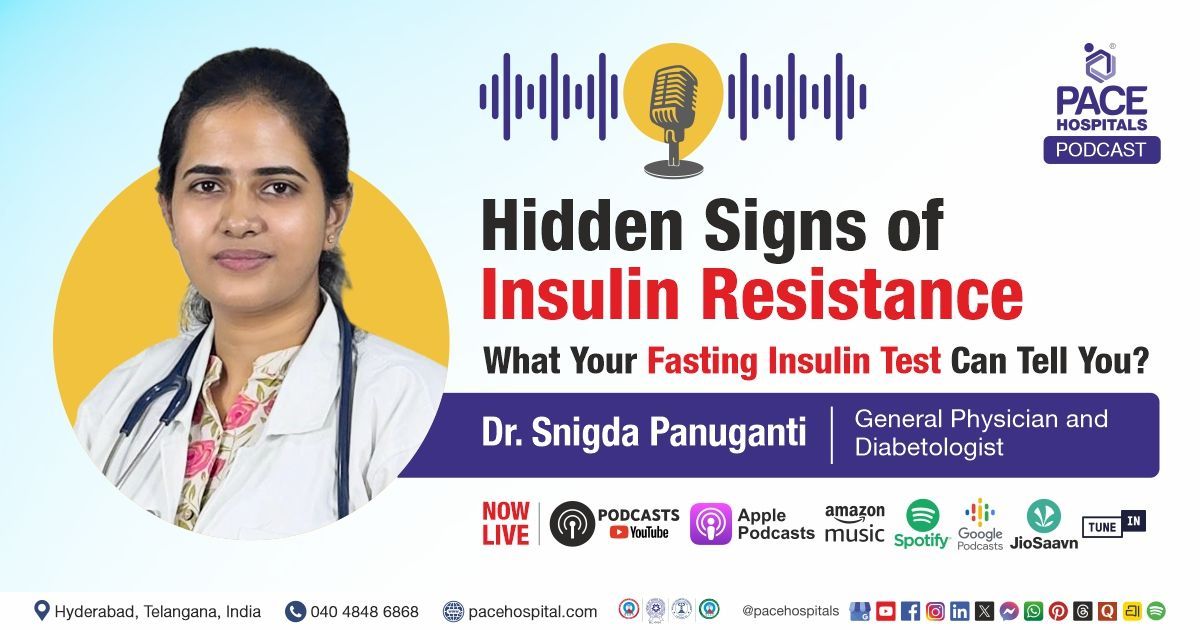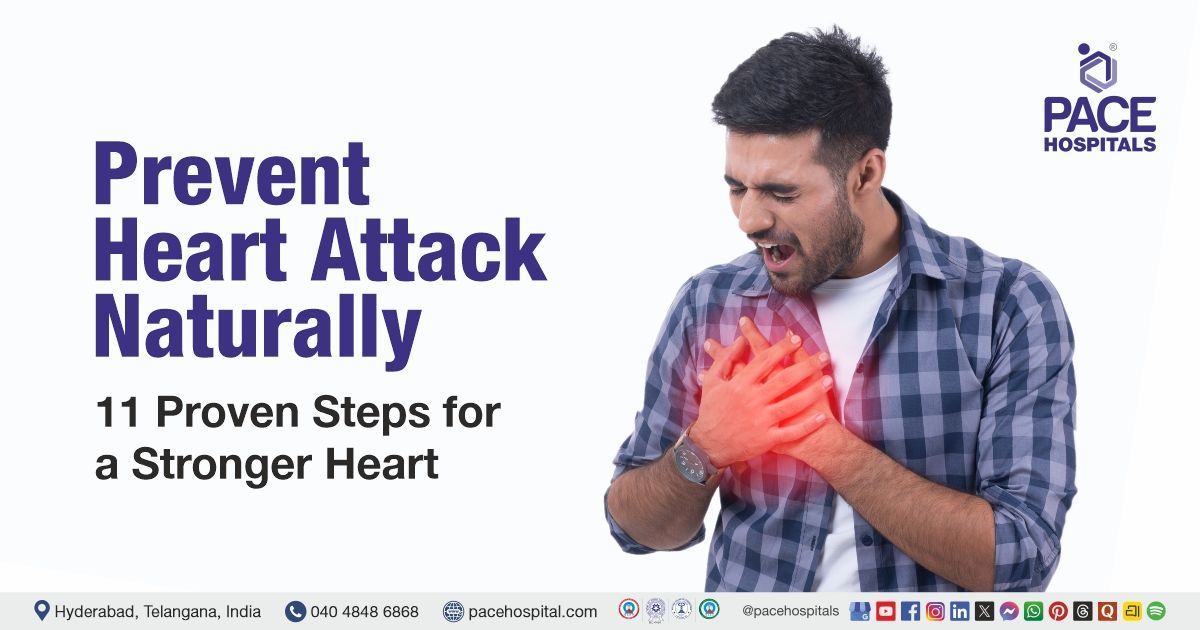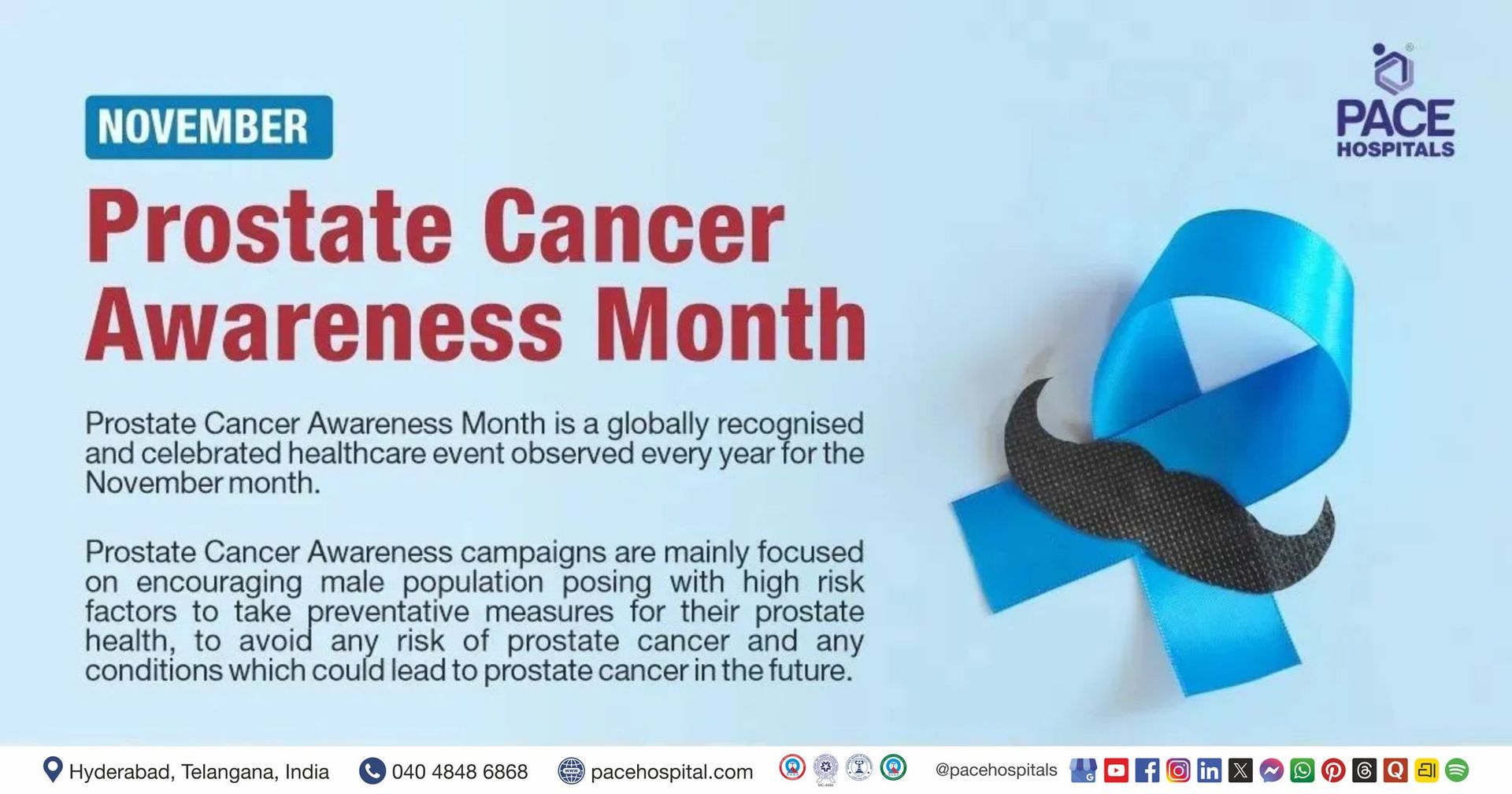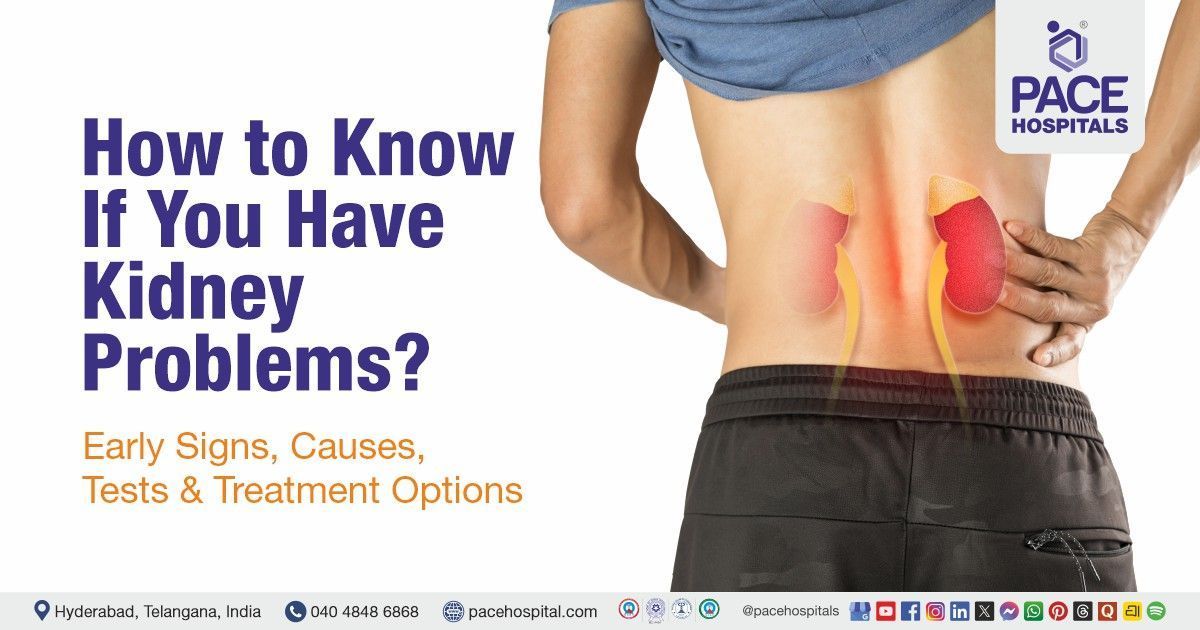Advanced Kidney Stone Removal & GERD Care with Bilateral URS in 56 Y.O. Male
PACE Hospitals
The PACE Hospital's expert Urology team successfully performed Bilateral Ureteroscopy (URS) with Double J (DJ) stenting on a 56-year-old male patient who presented with flank pain, acid reflux, and dyspepsia (indigestion). The procedure was performed to remove stones from both renal lower poles, effectively relieving the patient's symptoms and restoring proper kidney function to aid recovery.
Chief Complaints
A 56-year-old male patient with a
Body Mass Index (BMI) of 20.1,presented to the Urology Department at
PACE Hospitals, Hitech City, Hyderabad, with flank pain, acid reflux, and dyspepsia (Indigestion). He reported that his discomfort was affecting his daily activities and had not improved with initial medical management. A detailed evaluation was carried out to determine the underlying cause of his symptoms.
Past Medical History
The patient had no history of
diabetes,
hypertension, trauma, or chronic illnesses, and no known drug allergies. He presented with flank pain along with acid reflux and dyspepsia (indigestion). While his gastrointestinal symptoms suggested possible acid reflux or functional dyspepsia, the presence of persistent flank pain warranted further evaluation to rule out renal or other urological causes.
On Examination
Upon admission, the patient was afebrile with stable vital signs, and his general condition was satisfactory. He was conscious, alert, and showed no signs of acute distress. Physical examination revealed mild epigastric tenderness, with no significant abdominal distension, masses, or organomegaly.
Diagnosis
The patient initially underwent a comprehensive clinical assessment at PACE Hospitals, which included a detailed history and physical examination by the Urology team. During the evaluation, it was noted that the patient had been diagnosed with Bilateral lower pole renal calculi and gastroesophageal reflux disease (GERD), which required surgical intervention.
To support the diagnosis and assess the extent of the patient's condition, a series of relevant investigations were conducted.
- Blood tests: These were performed to assess renal function and metabolic status. These included serum creatinine, electrolytes, calcium, phosphorus, and uric acid levels. The results showed normal haemoglobin levels and no neutrophilic predominance, indicating the absence of active systemic infection. This suggested that the patient’s symptoms were likely due to localized inflammation from the renal calculi, rather than a systemic infection.
- Urinalysis and Urine Culture: These were conducted to detect the presence of hematuria, crystals, or signs of infection. A urine culture was also obtained to rule out urinary tract infection (UTI), as these findings are common in patients with renal calculi.
- Imaging Studies: A non-contrast CT scan of the abdomen and pelvis was performed, which is considered the gold standard for detecting renal calculi. Imaging confirmed the presence of bilateral lower pole renal calculi and assessed for any associated obstruction or hydronephrosis. Ultrasound was considered an alternative imaging modality if radiation exposure was a concern.
- UGI endoscopy: It involves inserting a thin, flexible tube with a camera (endoscope) through the mouth, down the esophagus, and into the stomach. This allowed the doctor to directly observe the lining of the esophagus and stomach for any signs of inflammation, erosions, ulcers, or other abnormalities that could be caused by acid reflux.
- Esophageal manometry: It was used to measure the pressure and coordination of the muscles in the esophagus. During this test, a thin tube was passed through the nose into the esophagus. The patient was asked to swallow small amounts of water, and the pressure changes in the esophagus were recorded. This helped determine whether the esophageal muscles were functioning normally, which is crucial for proper swallowing and preventing reflux.
Together, these tests provided valuable information about the structure and function of the oesophagus, helping to confirm the diagnosis and severity of GERD.
Based on the confirmed findings, the patient was advised to undergo
Kidney Stones Treatment in Hyderabad, India, under the expert care of the Urology Department, providing effective stone clearance, alleviating his flank pain, and minimizing the risk of renal complications. Concurrently, appropriate management was provided for GERD to control acid reflux symptoms and prevent further gastrointestinal complications.
Medical Decision Making
Following a detailed consultation with Dr. Abhik Debnath, Consultant Laparoscopic Urologist, and cross-consultation with Dr. Govind Verma, a comprehensive evaluation of the patient’s condition was undertaken. Considering his flank pain, acid reflux, and dyspepsia (Indigestion). Along with CT scan findings indicating bilateral renal lower pole renal calculi and UGI endoscopy and manometry revealed gastroesophageal reflux disease (GERD), the urology team determined that Bilateral ureteroscopy (URS) with DJ stenting, would be the most suitable and effective intervention.
Surgical Procedure
Following the decision, the patient was scheduled for Bilateral ureteroscopy (URS) and DJ stenting Surgery in Hyderabad at PACE Hospitals, under the expert supervision of the Urology Department, ensuring optimal care and a smooth recovery process.
- Preoperative Preparation and Spinal Anaesthesia: The patient was put on the surgical bed in the lithotomy position after informed consent and a careful preoperative evaluation. Throughout the treatment, spinal anaesthesia was used to ensure sufficient pain alleviation and muscle relaxation.
- Cystoscopy and Ureteral Access: To view the bladder and locate both ureteral orifices, a cystoscope was inserted into the urethra. To make access easier, guide wires were progressively advanced into each ureter under direct vision.
- Bilateral Ureteroscopy: In each ureter, a semi-rigid ureteroscope was carefully inserted over the guide wire. After a thorough examination of both ureters, any calculi found in the lower poles were treated. Depending on their size and consistency, stones were fragmented with a holmium laser and removed using a basket device.
- DJ Stenting: A Double J (DJ) stent was placed into each ureter to ensure adequate drainage of urine from the kidney to the bladder and to support post-operative healing.
- Completion: Hemostasis was achieved. The procedure concluded without complications, and the patient was shifted to the recovery room in stable condition.
Postoperative Care
After surgery, the patient was monitored closely in the surgical intensive care unit to ensure stability. His postoperative course was uneventful. A postoperative X-ray of kidneys, ureters, and bladder (KUB) was done, and it revealed no radio-opaque shadows, indicating no residual stones. The Foley catheter was removed on postoperative day 3. During his hospital stay, he received intravenous antibiotics to prevent infection, analgesics for pain relief, antiemetics to control nausea, and gastric protectants. The patient was discharged in stable condition.
Discharge Medication
Upon discharge, the patient was prescribed a course of oral medications tailored to support his recovery following the surgical removal of the bilateral lower pole renal calculi. These included oral antibiotics to prevent postoperative infections, analgesics for pain relief, and antipyretics to manage any potential fever. Urinary alkalizers were given to maintain an optimal urinary pH and reduce the risk of stone recurrence. Proton pump inhibitors were prescribed to protect the gastric lining from any medication-related irritation. Additionally, an alpha-blocker was administered to facilitate smooth urinary flow. The patient was also advised to take nutritional supplements to aid in overall recovery and support renal health.
Discharge Advice
The patient was advised to avoid weightlifting, forward bending, straining during bowel movements, and prolonged travel by bus, auto, or two-wheeler. Passage of small stone fragments, mild flank or suprapubic discomfort, occasional blood in urine, cloudy urine, or mild burning were expected and typically resolve within 7–10 days.
Emergency Care
The patient was informed to contact the emergency ward at PACE Hospitals in case of any emergency or development of symptoms like fever, abdominal pain, or vomiting.
Review and Follow-up Notes
The patient was advised to return for a follow-up visit with the Urologist in Hyderabad at PACE Hospitals, after 3 months for DJ stent removal, cystoscopy, RIRS+/-PCNL, and URS. This review is necessary to assess the patient's recovery, ensure proper healing, and evaluate the urinary tract for any complications or residual issues that may require further intervention.
Conclusion
This case highlights the effectiveness of Bilateral ureteroscopy (URS), with DJ stenting in managing bilateral lower pole Renal Calculi Treatment in Hyderabad, India, enabling successful removal of stones in the kidney, thereby facilitating normal urine flow, while simultaneously GERD management improved the patient’s overall health and quality of life.
Evidence-Based Diagnostic Workup in Patients with Bilateral Lower Pole Renal Calculi and GERD
In patients presenting with bilateral lower pole renal calculi and symptoms of GERD, the urologist/ urology doctor orders a non-contrast CT scan to precisely identify the size and location of kidney stones. Urinalysis is performed to detect hematuria and urinary tract infection, both common findings in nephrolithiasis. Blood tests, including serum creatinine, BUN, electrolytes, calcium, phosphorus, and uric acid, are arranged by the urologist to assess kidney function, calcium, uric acid, and electrolytes to evaluate metabolic risk factors for stone formation. The diagnosis of GERD was based on characteristic symptoms and a positive response to acid-suppressive therapy, with the urologist coordinating care as needed. Upper GI endoscopy was considered for refractory or atypical symptoms, with the urologist ensuring appropriate referral and follow-up. Metabolic evaluation and 24-hour urine collection are recommended for high-risk or recurrent stone formers to guide long-term preventive strategies and individualized management.
Share on
Request an appointment
Fill in the appointment form or call us instantly to book a confirmed appointment with our super specialist at 04048486868

